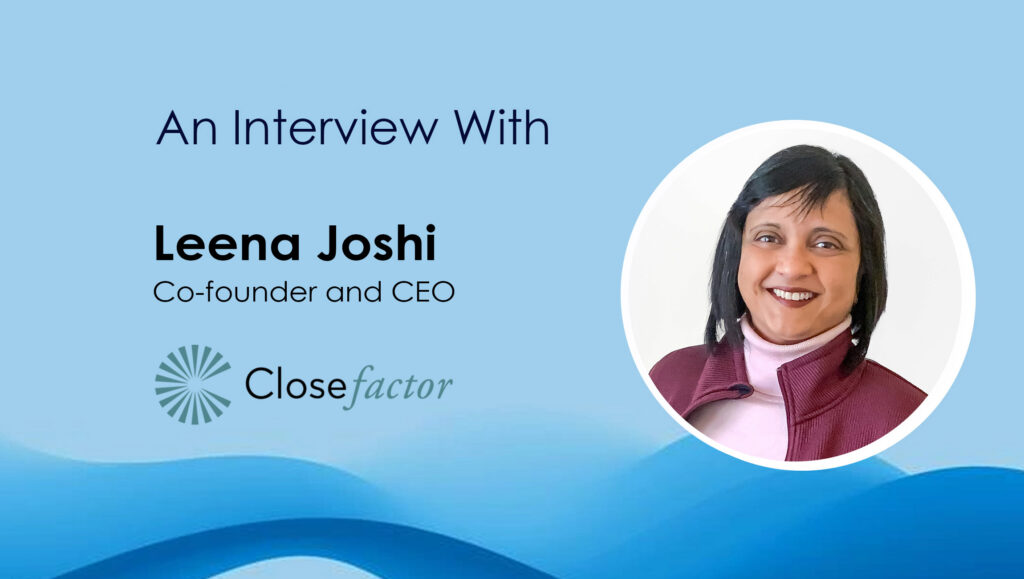Leena Joshi, Co-founder and CEO at CloseFactor highlights more about the state of modern day sales processes and the growing impact of salestech:
_________
Tell us a bit about your background in the industry and what led to co-founding CloseFactor.
I’ve spent a lifetime in enterprise software, working on go-to-market teams at companies like VMware, Splunk, and Redis. Co-founding CloseFactor came on the heels of spending time at a machine learning startup, where I got a glimpse into state-of-the-art natural language processing. I was running various aspects of GTM for the ML startup—inside sales, sales ops, and marketing—and was still doing core work like pulling account lists manually, sorting them by how likely they’d be a good target for us, pulling the in-depth research for our reps, etc. Everything was done manually. All of the sales and marketing enablement tools I was pitched were these huge repositories; data was pulled but not sorted, curated, or customized. There were no guarantees on accuracy, either.
My co-founders Ben Cheung and Erik Buchanan have spent years in machine learning and they pointed out rather easily that with the recent evolution of ML models, especially around topic extraction, we could automate what is a really painful part of building GTM strategy and tie it directly to execution. Their backgrounds from large companies like Google, LinkedIn, and Microsoft made it easy to visualize a solution that could actually curate the massive amounts of data available down to the exact right patterns that GTM teams need visibility into.
How have CloseFactor’s salestech solutions evolved since the company launched?
We launched initially with a solution focused on the sales rep’s problem: typically, you are looking for the top initiatives or projects inside a company that matches your sales play. For example, you may be looking for initiatives such as a new subscription model, or new products being launched, or applications being modernized.
For large accounts, CloseFactor surfaces up the exact teams or subsidiaries that have these initiatives. It then connects those current initiatives with insights into how the organization’s teams are actively investing and hiring for them, as well as target personas (matching your criteria) that are in charge of the initiatives. In other words, we took the reps’ workflow and automated it.
Once we did this at scale, we realized that reps could now get a picture of what is the total opportunity inside their entire territory and use the information like a “heat map” (honing in on the accounts that have the right projects/initiatives and personas most ripe to spend time on). Reps could surface up the research across hundreds of accounts ( instead of the 10-20 they could manually research), formulate a strategy to engage with the right personas at scale, and effectively amp up their execution!
From here, the CloseFactor product evolved to surfacing up the right TAM that is customized to every customer, with accounts scored by how close they fit their ICP. The solution is always underpinned by the execution blueprint, ensuring B2B sales leaders and marketing leaders have a detailed understanding of their prospective customers and can tailor and customize their spend/staffing to their actual market, not guesstimates.
We’ve been proud of the rather rapid B2B sales transformations that CloseFactor’s solutions have delivered for B2B sales leaders and their teams, at scale, at fast-moving companies. For example, developer-targeted tech unicorn LaunchDarkly wanted a way to cut through the noise and focus on prospects’ teams who had the exact pains that LaunchDarkly’s product could alleviate. Putting our tools into place, LaunchDarkly uncovered 2000 opportunities across 600 accounts. They grew their pipeline and revenue 4x and mostly because their pipeline was filled with the most relevant and likely-to-buy opportunities.
Read More: SalesTechStar Interview with Troy Townsend, CEO and Co-Founder at Zitcha
When it comes to B2B technology sales and managing more complex / longer deals: what do you feel B2B salespeople need to do in order to drive more efficient closes and better customer journeys?
The success of any B2B technology product or sales team depends on not just closing a deal but really solving the customer’s problem. While many of us think each problem is unique to a person and company, as a product company you can scale only when you solve problems that are general enough across a group of people.
This group of people is the user persona. However, in a sales situation, the person paying for the solution is often different (economic buyer) from the person benefiting from the solution (champion or influencer). Knowing this ahead of time helps sales teams not waste time with the wrong folks.
Managing complex B2B technology deals means that salespeople have to be good at multi-threading. This is especially the case in highly matrixed environments, where teams have to build relationships and support across multiple teams of influencers. They have to unearth connections to their deals so they can use their champions more effectively. They also have to stay on top of the top priorities of the account they are selling into, so that their deal doesn’t go sideways due to changing priorities.
Can you talk about five ways you see recent sales tech innovations changing the B2B selling game, and how these will impact the future of B2B sales?
With AI, ML, and workflow automation, sales tech innovations are about to take the gruntwork out of sales and help salespeople connect with their prospects on a much more personal, more contextual level. Relationship-based selling is not going away anytime soon, but the groundwork that salespeople have to do to be fantastic at their job is about to get a lot easier. Tech-savvy salespeople that can harness these technologies are about to win big, especially if some of the latest tech has also been applied to generating the right ideal customers, the right buyer personas, and the right messaging.
Particularly with recent evolutions in machine learning, GTM leaders and salespeople do not have to rely on guesswork to determine which prospects are right for them. They can scale the manual research they do across hundreds of accounts using machine intelligence—and that’s like suddenly gaining superpowers!
What do you feel are some of the biggest challenges that B2B sales leaders still aren’t addressing enough with the teams/processes they manage?
Many B2B sales leaders are still living in the days where they cut territories in a certain way and blame the reps when numbers aren’t met. They are opportunistic rather than data-and-pattern driven, which makes predictability low and growth slow. Enablement is critical to rep productivity and often there isn’t enough of it. The net results are high sales churn, customer churn, and poor productivity.
Sales leaders need to experiment, they need to measure, and they need to systematize repeatable patterns. Today’s sales tech can more than support their needs; it needs to be able to understand what moves the needle and use it.
B2B sales is all about timing. Timing of meeting the right person with the right pain at the right time. You increase your chances of winning when you have lots of such people across many companies that you are spending time with. You decrease your chances if you are having general conversations with people who have nothing to do with the problem you solve.
This is why defining an ICP is critical. The Ideal Customer Profile shouldn’t just apply to the right persona, it’s also about the right account. Most salespeople pick accounts randomly, or based on firmographics (horoscopes). We at CloseFactor think of it more deeply: as accounts at the right stage in the customer journey.
For example, you may sell a great product that helps with data migrations, or a solution that offers best-in-class cloud native security. No matter how good the technology is, there is no point selling data migration solutions to a company that is not moving their data, and no point selling cloud native security solutions to companies that don’t have much cloud native development going on!
What are some areas where sales leaders can/should tap into automation (or more automation) to help drive results? Conversely, are there areas where automation is less helpful than it’s perceived in the industry?
One area where B2B sales leaders still hire consultants to do manual work is determining their TAM size, how big their ideal customer opportunity is, and how to use it to drive execution. But these B2B sales leaders often do not realize that with state-of-the-art products like CloseFactor, all of this GTM planning can be automated—and done with a blueprint underpinning it all that can be used by sales and marketing execution teams. So, they spend millions of dollars when they can get better, more accurate, and more actionable results with technology.
Where automation is less helpful is when sales reps use it to simply spray-and-pray emails and phone calls. That ends up wasting time and money for everyone—for the rep, for their sales leaders, for the poor unsuspecting receivers, all of them.
Read More: The Value of Coaching to Drive Sales Methodology Adoption
Perhaps from a more macro viewpoint, how do you see the future of sales tech and B2B sales playing out over the next year and beyond?
B2B sales and marketing are going to continue to converge into a GTM team. Increasingly, they are no longer driving to separate numbers, and that trend will continue. What we’ll see more of is the inclusion of customer success into this equation, and bringing in the right customers to increase annual contract value (ACV) and customer lifetime value (LTV). And with the latest and greatest technologies, the industry as a whole is evolving to buying pain-based selling. That will especially be the case with B2B technology products no matter your GTM motion, whether product-led or sales-led, sales-assisted, etc.
CloseFactor uses machine learning to automatically curate unstructured information about companies and extract meaningful intelligence that go-to-market teams can act on. With this intelligence, CloseFactor help companies identify their best customers, empower their sales forces at scale, and exceed growth expectations.
Leena Joshi is the co-founder and CEO at CloseFactor, which provides B2B sales and GTM teams with automated sales research and contextual insights. Joshi has had a long career in enterprise software, including at Redis, Splunk, VMware, and Intel, among others. She lives in the Bay Area, where CloseFactor is headquartered.
Missed The Latest Episode of The SalesStar Podcast? Have a quick listen here!
Episode 144: What Drives Better B2B Performance: with Rachel Clap Miller – VP of Marketing and Digital Engagement at Ascender by Force Management
Episode 143: Uncovering the Evolution in Retail Media with Mikey Paley, SVP of Business Development, Retailers at Aki Technologies
Episode 142: Go-To-Market Best Practices with Jeffrey Ha, Chief Go-to-Market Officer at Rev























